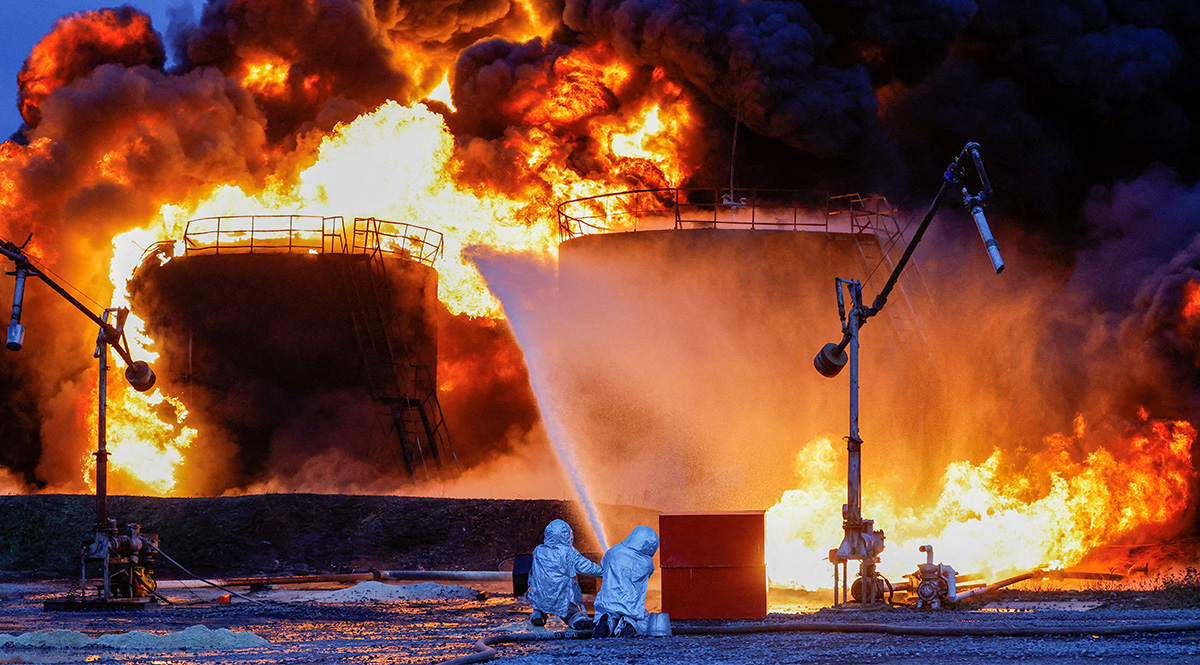Ukrainian Attacks Destabilise the Russian Fuel Market
Over the past two weeks, Ukrainian drone attacks on Russian energy infrastructure have intensified. Most of the incoming drones are neutralised by air defences, but those that hit their targets have caused significant damage to the Russian oil sector. These strikes may exacerbate the fuel crunch in Russia and reduce exports of sanctioned petroleum products.
 Alexander Ermochenko / Reuters / Forum
Alexander Ermochenko / Reuters / Forum
What energy infrastructure has been damaged as a result of the Ukrainian attacks?
Ukraine has made a concerted effort to reduce Russia’s oil processing capacity, hitting refineries across the country. According to Ukrainian and Western media reports, the multi-day drone attacks on Russian infrastructure are some of the most extensive air operations on Russian territory. As a result, refineries producing mainly for the domestic market and belonging to Lukoil and Rosneft and other installations in Nizhny Novgorod, Kuban, Ryazan, Samara, and Kaluga oblasts, as well as in Krasnodar Krai, were damaged. According to Bloomberg estimates, these facilities account for about 12% of Russia’s crude oil processing capacity. It is difficult to estimate the exact losses, but according to media reports, for example the attack on the largest of the attacked plants—Lukoil in Nizhny Novgorod (located 1,000 km from the Ukrainian border—operations there have been partially halted, and there is no information on when processing will resume. Numerous fuel depots and power grids were also attacked.
What are the consequences of the attacks for Russia?
The latest attacks are a continuation of Ukraine’s efforts to provoke a fuel crunch in Russia and limit its income from the sale of petroleum products. As a result of accidents and attacks in January just on the Tuapse refinery and the terminal in Ust-Luga, Russia was forced to introduce a six-month embargo on gasoline exports at the beginning of March this year. This reduces revenues to the central budget and confirms Russian logistical problems resulting from the Ukrainian strikes. In addition, there are structural problems with oil processing resulting from logistical and technological limitations, the industry’s structure, and tax burdens.
The latest attacks may tighten the clinch on the Russian fuel market, which has already led to increases in petrol and diesel prices, among other consequences. This can directly increase the cost of living for Russians and undermine the sense of security, negatively affecting public sentiment. In addition, short-term reductions in fuel stocks and problems with logistics may limit their availability and hinder supplies to the military.
What impact will the attacks have on the global oil and fuel market?
World markets remain relatively insulated, with just a moderate impact from the attacks, but the intensification in the last week has pushed up oil prices by about 4%, which translates into an increase of $2-3 per barrel. As a result of the growing problems with oil processing in Russia and the Kremlin’s export embargo on gasoline, Western analysts expect further increases in commodity prices. Although most of the Ukrainian attacks have targeted refineries processing oil for the domestic market, Russian exports will likely be further reduced, with a decline in sales possibly visible in the supply of refined petroleum products to Turkey, Brazil, and Saudi Arabia. This will minimise Russian oil companies’ revenues and investment opportunities, as oil sold on the domestic market yields lower margins. During the peak summer demand, Russia may be forced to import fuel from Belarus.
What does this mean for Western sanctions policy?
The tightening Russian fuel market, which aligns with the West’s aims, is also the result of the technological restrictions imposed on Russia. Most of the refinery upgrades carried out in recent years were conducted with Western components and know-how. According to the available information, the damaged installations (e.g., in Nizhny Novgorod) contained components that cannot be imported from the West due to sanctions. It is unknown when or whether it will be possible for the domestic industry to produce spare parts as it is characterised by lower productivity and typically lacking relevant environmental standards, which may contribute to a permanent increase in oil processing costs. Technological sanctions may also result in a reduction in the quality of the products.
It is in the interest of the sanctioning coalition (including Poland) to enforce the restrictions on the energy sector more effectively, especially the price-cap mechanism.


.png)


